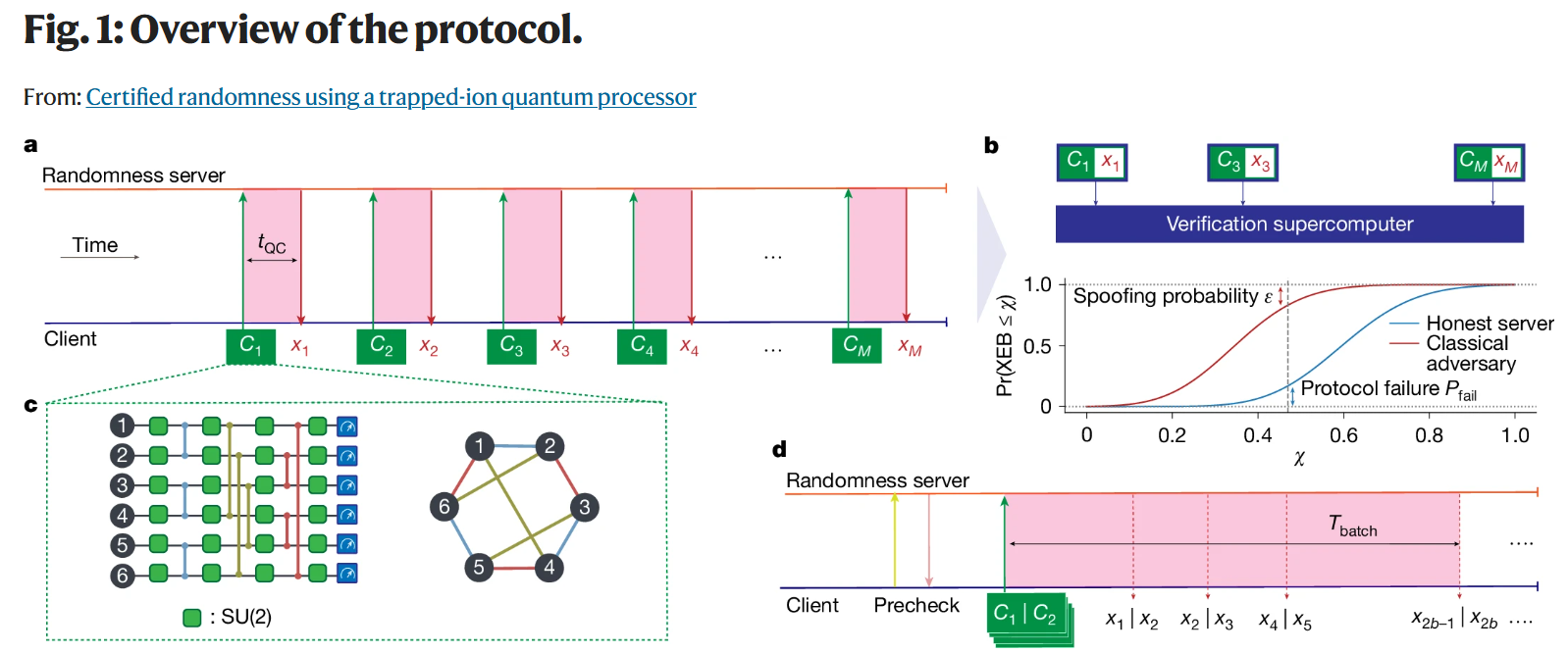来自摩根大通、Quantinuum等公司的研究团队表明,量子计算机可以生成“可认证的随机”数字,这可能改善我们从银行到投票系统的安全性。
事实证明,一些计算机程序使用的随机数字并不那么随机。
在密码学中——例如双因素认证和密码密钥的技术——生成随机数字以保护系统免受黑客攻击。但传统计算机通常使用的算法只是模拟随机性,实际上是基于算法公式的,如果有人找到了模式,就可能被黑客攻击。
“想象一下,我们有一个列表,从‘方块A’开始,53个项目后以一个小丑结束。为了在计算机上洗牌,我可能会使用Knuth洗牌算法,这是一种众所周知的算法。问题是,如果我们在有序的‘牌组’上再次使用相同的‘种子’运行该算法,我们会得到相同的‘洗牌’输出,”数据安全公司Protegrity的高级产品安全架构师Clyde Williamson告诉Decrypt。
这一突破发表在Nature上,证明团队能够实现认证随机性,这意味着这些数字是可以证明的随机且不可破解。
研究团队使用Quantinuum的56量子比特陷阱离子计算机,生成了超过70,000个认证随机位,生成每个位的过程仅需几秒钟,但需要四台世界顶级超级计算机不间断工作才能伪造——也就是说,生成一个类似的序列,使用数学公式使过程看起来是确定性的。
这些数字后来由一组超级计算机验证,能够证明在其生成过程中没有涉及数学算法。
这一成就标志着超越以往量子计算声称的重要一步,以往的声称往往涉及一些人为的任务,缺乏实际的价值。这一次,应用解决了网络安全中的一个基本挑战:创建可证明无偏和不可预测的随机数字。
“传统的随机数生成面临两个主要挑战:熵源的潜在操控或可预测性,以及伪随机数生成器用于扩展熵的算法的弱点,”加密消息应用程序Session的联合创始人——也是隐私币Oxen白皮书的共同作者Kee Jefferys告诉Decrypt。“量子随机性引入了一种根植于量子力学过程内在不可预测性的根本不同的熵源。”
生成真正随机性的能力依赖于量子力学的奇特世界。量子计算机使用量子比特而不是二进制比特,使它们能够同时存在于多种状态,这得益于一种称为叠加态的现象——这一状态因薛定谔著名的解释而广为人知,提出了一只同时活着和死去的猫在一个盒子里。
当被测量时,这些量子比特产生真正随机的结果——这并不是因为我们缺乏信息,而是因为自然本身在观察发生之前并没有确定结果。换句话说,猫只有在有人打开盒子时才会活或死。
(简而言之:量子计算机在生成真正随机数字方面更具优势,因为量子力学本质上是非确定性的——而经典计算机是伪装成随机的确定性机器。)
该协议通过量子计算和经典计算之间的巧妙互动来工作。首先,量子计算机执行所谓的随机电路采样,这是一种用于量子计算的技术,用于基准测试和展示量子优势——即在量子计算机上执行任务的速度比任何已知的经典计算机都要快。
它每次生成的输出大约需要两秒钟。然后,阿贡国家实验室和橡树岭国家实验室的经典超级计算机花费了18小时使用一种称为交叉熵基准测试的技术来验证这些输出,确认它们无法通过经典手段生成。

这一验证过程确保随机数字没有被任何人操控——甚至连量子计算机的制造商也没有。这在之前是无法实现的,标志着首次使用通用量子计算机在大规模上生成公开可验证的、认证的量子随机性。
确保随机性正确的重要性不言而喻。Duncan Jones, Quantinuum的网络安全负责人——该研究实验室与摩根大通共同参与了这项研究——指出了随机性失败时发生的一些戏剧性例子。
“在2010年,索尼的PlayStation泄露事件发生,因为开发人员未能使用强随机数生成,导致攻击者暴露了私有加密密钥,”Jones告诉Decrypt。“更近期的波利nonce攻击(2014-2023)利用了比特币钱包随机性弱点,导致140个比特币(约1000万美元)的盗窃。”
ARPA Network的首席执行官Felix Xu强调了另一个代价高昂的事件:“一个臭名昭著的例子是2013年Android SecureRandom漏洞,其中比特币钱包应用程序中的弱熵使攻击者能够窃取私钥,导致数百万美元的比特币被盗。”
“同样,在2019年,YubiKey的FIPS认证硬件令牌中确定性随机比特生成的缺陷实现暴露了加密密钥,可能导致泄露,”Xu指出。
这些影响跨越数字安全领域,并可能为量子计算机的实际用户打开大门。更好的随机数字意味着更强的加密密钥,适用于从在线银行到政府应用、消息应用和社交媒体的所有领域。它们还可以使数字签名系统更安全,提供更安全的加密钱包,并防止数据篡改等。
认证随机性的一个特定用例是无信任随机信标:一种公共服务,定期发出真正的随机数字,任何人都无法预测、操控或伪造——就像一个通用的双因素认证代码生成器——并以任何人都可以验证的方式进行。
“对于区块链,量子认证的随机性可以驱动真正公平和防篡改的共识算法,显著增强以太坊和Solana等平台抵御操控的能力,”Xu告诉Decrypt。
“任何依赖随机数字的智能合约或共识机制都可以通过‘调用’量子随机数来改善,”Protiviti的量子计算服务主任Konstantinos Karagiannis告诉Decrypt。
公共彩票、赌博网站、银行业务、进行A/B测试的营销公司和生物研究公司都是可以从真正的随机数生成中大大受益的企业。
尽管前景广阔,但该技术仍不适合日常使用。验证阶段目前需要大多数组织所缺乏的超级计算能力,这意味着现在实施并不值得麻烦。
然而,Quantinuum的Jones表示,这项技术已经朝着可及性发展,其他参与者也在寻找更可持续的路径。
“虽然JPMC的研究需要超级计算机进行认证,但Quantum Origin采取了不同的方法,”他说。“它利用量子计算机上的贝尔测试生成量子种子(强种子)。一旦生成量子种子(这是一个一次性过程),它就会嵌入到软件中,并可以将任何本地随机源升级为‘量子’随机性。”
通往主流采用的道路似乎充满希望,标志着专家们首次认为量子计算在短期内可能具有实际的大规模应用。
“芯片规模可能会继续变得更便宜(并且希望能更抗噪声)。在这个十年内将它们添加到几乎任何设备上可能是可行的,”Karagiannis告诉Decrypt。这也是Xu所认同的愿景。
“至于云上的应用,真实量子计算机生成的数字可能会作为工作负载的一部分轻松获得,”Karagiannis补充道。“你可能有一天会为多个功能添加量子处理单元(QPU),包括随机数。”
如果他是对的,并且这项技术证明成功,我们最终可能会朝着一个互联网发展,在这个互联网中,欺骗攻击在数学上变得不可能,而不仅仅是困难,从而创造一个基于量子物理奇异特性的根本更安全的数字世界。
免责声明:本文章仅代表作者个人观点,不代表本平台的立场和观点。本文章仅供信息分享,不构成对任何人的任何投资建议。用户与作者之间的任何争议,与本平台无关。如网页中刊载的文章或图片涉及侵权,请提供相关的权利证明和身份证明发送邮件到support@aicoin.com,本平台相关工作人员将会进行核查。




